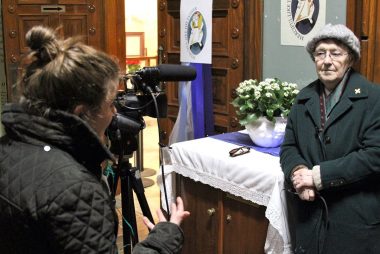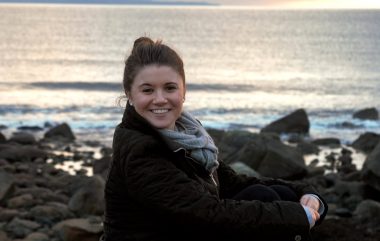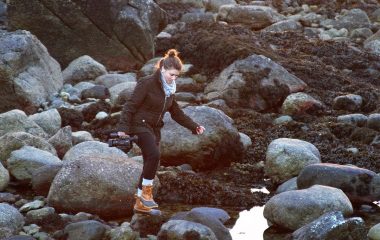Elon University senior Meredith Stutz spent a week abroad in January as part of her Pulitzer Center Student Fellowship, collecting insights and opinions while examining the European country’s once devout Catholic population.

Thanks to sporadic bus transportation, Stutz and fellow Elon journalism major Michael Bodley ’16 – also a Pulitzer Student Fellow – missed their ride to Galway, a harbor city on Ireland’s west coast, to meet with and interview Father Diarmuid Hogan. So, the priest came to them, picking up the duo in his own SUV and piloting them around the Irish countryside. Father Hogan’s chattiness, zip-up hoodie jacket and Bluetooth only heightened the surreal experience, noted Stutz.
Acting the part of driver, tour guide and historian, Father Hogan educated the student journalists on Ireland’s complicated history, much of it intertwined with the Catholic Church. This impromptu field trip played a significant role in giving Stutz her bearings as she investigated the future for the Catholic Church in Ireland, the topic for her fellowship assignment.
The Pulitzer Center on Crisis Reporting published Stutz’s coverage in mid-February and it includes a nearly seven-minute video titled “What’s Next for the Catholic Church in Ireland?”
“Through the power of Google, I was fortunate to find Father Hogan before the trip, and he could not have been more generous and gracious to us while we were there,” said Stutz, an Elon Communications Fellow. “He essentially acted as my handler, setting me up and finding me contacts and people I should talk to.”

As many European media outlets have publicized, with the rise of modernization, secularization and church scandals, Ireland’s once devout Catholic population has lost much of its faith. The country’s decision last year to approve same-sex marriage only heightened the religion’s lack of public standing.
“That bombshell went off last May, so I wanted to know what was next for the church,” Stutz said. “That was my story, and I wanted to look at all sides of it. I wanted to see what the Catholic Church had to say and what it is doing now. And after I started researching the topic, I wanted to know what people my age thought. There have to be strong Catholic millennials, so what are they thinking now?”
Stutz, who considers herself a devout Christian, said her own faith also influenced her decision to pursue the subject and how she investigated it. “That really played a role in my finding the mindset for the story,” she explained.
The senior reporter for Elon Local News built her coverage around interviews with Hogan, John Cunningham, a university history lecturer, Daniel Gallagher, a young deacon, and Q&As on the streets of Galway.
Accustomed to 90-second spots for Elon’s student newscast, Stutz discovered she required far more time to articulate the narratives she heard while in Ireland. “I knew I needed to include all of these different voices, and make it as balanced as I could,” she said. “I wanted it have a little humanity, and at the same time have a little bounce to it. I wanted it to flow.”

“I’m grateful I got the opportunity to take this from pitch to final export and upload it to the site,” Stutz said. “I never thought I would have the opportunity to go to Ireland at this point in my life. And to go to as a sponsored journalist for the Pulitzer Center, what could be better than that?”
Scott commended the young journalist for the breadth and appearance of her final package.
“I was impressed with how she found different people and brought different dimensions to her story,” said Scott. “It has some depth to it. It moves along well. And it has a strong ending, which isn’t easy to do.”
The Elon professor added that the video showcases Stutz’s strengths as a reporter as well as a storyteller.
“Any time you go off to do an in-depth story, you hope that you’ll find honest and sincere stories from real people. You want to find people who will enrich the story you want to tell, and Meredith’s awfully good at that,” Scott said. “She’s curious and she’s a person-oriented journalist. She loves talking to people, listening to them, and letting them tell their own story.”
Pulitzer Center on Crisis Reporting
The Pulitzer Center on Crisis Reporting is a nonprofit journalism organization in Washington, D.C. The center supports independent journalists who cover international topics that are under-reported by traditional media outlets. The School of Communications is a member of the Campus Consortium of the Pulitzer Center on Crisis Reporting. Elon is one of about 20 partner colleges and universities in the consortium, which enables students to serve as reporting fellows and to produce work for the center’s website.


